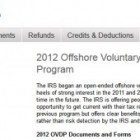
May 14, 2013
In January 2012, the IRS began an offshore voluntary disclosure program (OVDP). This is on the heels of strong interest in the 2011, and 2009 programs (first and second initiatives) It is designed to offer those who have undisclosed income from offshore to get current in their tax returns. While there is a higher penalty with the 2012 OVDP, benefits are more encouraging to taxpayers to disclose foreign accounts now, or they will risk criminal prosecution if the IRS detects any wrongdoing.
In 2009, Malibu resident John McCarthy pleaded guilty to failing to inform the government of a Swiss bank account as part of a scheme to move at leas $1 million from the US into Swiss bank accounts. McCarthy was sentenced to three years of supervised release with six months served in home detention and 300 hours community service. He also was ordered to pay a $25,000 fine.
Talking to a tax lawyer will help you figure out what to do and which forms to fill out under this new program. Failure to report offshore income accounts with a TD F 90-22.1, Report of Foreign Bank and Financial Account, could result in significant fines, and penalties as the IRS has ramped up its ability to find tax-evaders. If you have an offshore account and fail to pay taxes on it, you could be facing criminal consequences.
In return for meeting the requirements of this third initiative, the IRS has agreed not to pursue the following:
Charges of criminal tax evasion which would have resulted in jail time or a felony on your record; and other fraud and filing penalties including IRC Sec. 6663 fraud penalties, and failure to file a TD F 90-22.1, Report of Foreign Bank and Financial Accounts Report, (FBAR)
—————————————————————————————————————-
Guest post is provided by the Law Offices of Jeffrey B. Kahn, P.C., a trusted tax lawyer in Los Angeles. View the website for more details.
